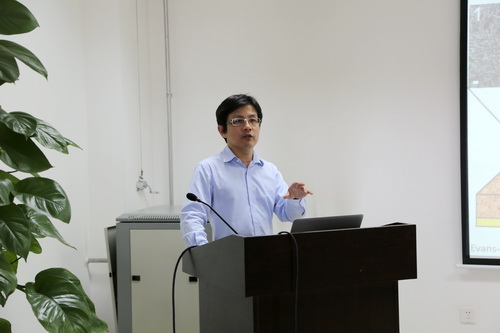
Invited by Key Laboratory of Photochemical Conversion and Optoelectronic Materials, Technical Institute of Physics and Chemistry, Chinese Academy of Sciences (TIPCCAS), Dr. Heng Zhu from Department of Pharmacology Johns Hopkins University School of Medicine visited TIPC on July, 4 and gave an academic report entitled Current Development of Protein Microarray Technology and Its Applications.
Functional protein microarrays are emerging as a promising new tool for large-scale and high-throughput studies. In the first half of this talk, Dr. Heng Zhu first gave a brief introduction of this technology, followed with discussion of recent developments of this new technology with regard to its fabrication and associated detection methods. To illustrate its wide applications in biology, in the second half Dr. Heng Zhu reported their latest effort in the construction of a high-resolution phosphorylation network in humans. Using a human protein microarray, they have identified protein substrates of over 340 human kinases. In conjunction with information provided by the mass spectrometry technology and bioinformatics analyses, they were able to connect many protein kinases to their substrates on a particular amino acid residue. This effort has paved the way to discover novel signaling pathways.
Dr. Heng Zhu is an Associate Professor in the Department of Pharmacology and Molecular Sciences, a member of the High-Throughput Biology Center at the Johns Hopkins School of Medicine. Dr. Zhu also holds affiliate faculty position at the Hopkins Oncology Center. He obtained his B.S. degree in Chemistry at Peking University and his Ph.D. degree in Genetics at Clemson University, U.S.A. He was a Damon Runyon Postdoctoral Fellow in Dr. Mike Snyder’s laboratory at Yale University. Dr. Zhu was an inventor of functional protein microarrays. His major research focus is to develop and apply the protein microarray technology to discover novel biological functions and pathways. His laboratory has developed a series of protein microarray-based approaches to identify substrates of various types of protein modification enzymes, to profile protein-DNA interactions, to determine important player in pathogen-host interactions, and to identify biomarkers for human diseases and cancer. Dr. Zhu holds two patents and seven are pending. He is one of the cofounders of CDI Laboratories, Inc. He has published 87 scientific articles.

